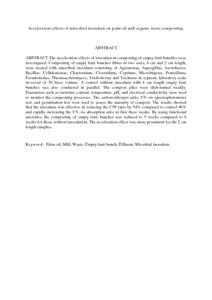Citation
Chin, Nyuk Ling and Yeoh, Chui Yen and Tan, C. S. and Ooi, H. S.
(2011)
Acceleration effects of microbial inoculum on palm oil mill organic waste composting.
Compost Science and Utilization , 19 (2).
pp. 135-142.
ISSN 1065-657X
Abstract
ABSTRACT
The acceleration effects of inoculum in composting of empty fruit bunches were investigated. Composting of empty fruit bunches fibres in two sizes, 4 cm and 2 cm length, were treated with microbial inoculum consisting of Agromonas, Aspergillus, Azotobacter, Bacillus, Celhdomonas, Chaetomium, Clostridium, Coprinus, Microbispora, Penicillium, Pseudomonas, Thermoactinomyces, Trichoderma and Trichurus in separate laboratory scale in-vessel of 30 liters volume. A control without inoculum with 4 cm length empty fruit bunches was also conducted in parallel. The compost piles were shift-turned weekly. Parameters such as moisture content, temperature, pH, and electrical conductivity were used to monitor the composting processes. The carbon-nitrogen ratio, UV-vis spectrophotometer test, and germination test were used to assess the maturity of compost. The results showed that the inoculum was effective in reducing the C/N ratio by 54% compared to control 46% and rapidly increasing the UV-vis absorption ratio in first three weeks. By using functional microbes, the composting of empty fruit bunches was reduced to 5 weeks compared to 9 weeks for those without inoculation. The acceleration effect was more prominent for the 2 cm length samples.
Download File
![[img]](http://psasir.upm.edu.my/23249/1.hassmallThumbnailVersion/Acceleration%20effects%20of%20microbial%20inoculum%20on%20palm%20oil%20mill%20organic%20waste%20composting.pdf)  Preview |
|
PDF (Abstract)
Acceleration effects of microbial inoculum on palm oil mill organic waste composting.pdf
Download (84kB)
| Preview
|
|
Additional Metadata
Actions (login required)
 |
View Item |

